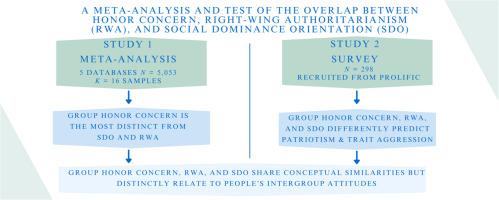荣誉关怀、右翼威权主义与社会支配取向重叠的元分析与检验
IF 2.2
Current research in ecological and social psychology
Pub Date : 2025-01-01
DOI:10.1016/j.cresp.2025.100238
引用次数: 0
摘要
荣誉关怀——一种描述以文化上适当的方式维护名誉的重要性的意识形态——被理论化为人们偏见和暴力的基础。然而,荣誉关注领域在概念上与其他偏见来源重叠:右翼权威主义(RWA)和社会支配取向(SDO)。在研究1中,我们使用元分析(k = 16; n = 5053)测试了荣誉关注域与RWA和SDO之间的统计重叠。结果表明,群体荣誉关注最为明显,与RWA仅有适度重叠;男性和女性荣誉关注与RWA呈显著正相关。群体荣誉与SDO不相关,而男性荣誉关注和女性荣誉关注与SDO分别呈强、弱正相关。然而,最初的研究并没有将每个因素作为偏见相关结果(例如,爱国主义和特质攻击)的不同预测因素。在研究2中,从美国和意大利的在线样本收集的数据(n = 298)解决了这一差距。潜变量模型显示,群体荣誉关注正向预测爱国主义,负向预测一般特质攻击,高于RWA和SDO。总的来说,这些研究表明群体荣誉关注、RWA和SDO在概念上有相似之处,但又有所不同。需要进一步的研究来检验群体荣誉关注预示着更高的攻击性和偏见的具体背景。本文章由计算机程序翻译,如有差异,请以英文原文为准。

A meta-analysis and test of the overlap between honor concern, right-wing authoritarianism, and social dominance orientation
Honor concern—an ideology describing the importance of maintaining reputation in culturally appropriate ways—are theorized to underlie people’s prejudice and violence. However, the domains of honor concern conceptually overlap with other sources of prejudice: right-wing authoritarianism (RWA) and social dominance orientation (SDO). In Study 1, we tested the statistical overlap between honor concern domains with RWA and SDO using a meta-analysis (k = 16; n = 5053). Results identified group honor concern as the most distinct, sharing only moderate overlap with RWA; masculine and feminine honor concern were strongly positively correlated with RWA. Group honor was not correlated with SDO, while masculine and feminine honor concern were strongly and weakly positively correlated with SDO respectively. However, the original studies did not examine each as distinct predictors of prejudice-related outcomes (e.g., patriotism and trait aggression). In Study 2, data collected from online samples from USA and Italy (n = 298) addressed this gap. Latent variable models indicated that group honor concern positively predicted patriotism and negatively predicted general trait aggression, over and above RWA and SDO. Overall, these studies suggest that group honor concern, RWA, and SDO share conceptual similarities but are distinct. Further research is needed to examine the specific contexts in which group honor concern predicts heightened aggression and prejudice.
求助全文
通过发布文献求助,成功后即可免费获取论文全文。
去求助
来源期刊

Current research in ecological and social psychology
Social Psychology
CiteScore
1.70
自引率
0.00%
发文量
0
审稿时长
140 days
 求助内容:
求助内容: 应助结果提醒方式:
应助结果提醒方式:


